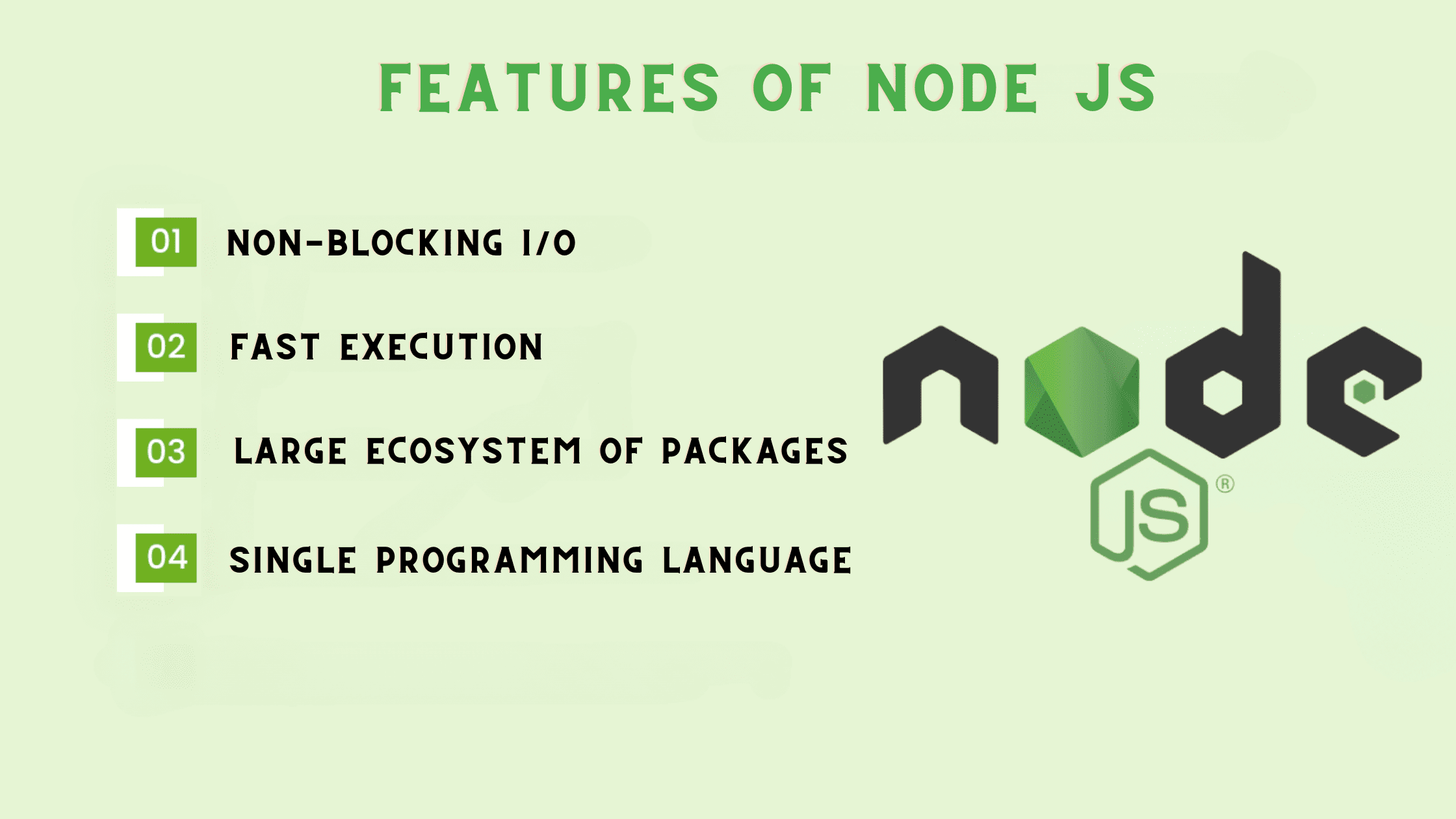In recent years, Node.js has become a linchpin in modern web development, reshaping how applications are built and executed. Originating as an open-source project in 2009, Node.js, with its event-driven, non-blocking I/O model, has propelled JavaScript beyond the confines of the browser. In this comprehensive exploration of Node.js development, we’ll unravel the intricacies of its architecture, its myriad applications, and the tools that have become indispensable for developers.
What is Node.js Development?
Node.js is a JavaScript runtime built on Chrome’s V8 JavaScript engine. Its design philosophy centers around creating scalable network applications, making it particularly apt for real-time applications. Unlike traditional server-side technologies, Node.js operates on a single-threaded event loop, allowing it to handle a large number of concurrent connections efficiently.
What is Node.JS Used For?
Node.js finds its application in diverse use cases because it can handle asynchronous operations seamlessly. It excels in scenarios demanding real-time communication, such as chat applications and online gaming platforms. Additionally, it’s the go-to choice for building APIs and microservices due to its lightweight and efficient nature.
Here are some key use cases for Node.js:
Web Server: Node.js can create lightweight and efficient web servers. It works great when managing lots of connections at once.
API Development: Node.js is often used to build RESTful APIs (Application Programming Interfaces). It’s trendy to create APIs that interact with databases.
Real-time Applications: Node.js is well-suited for real-time applications like chat applications, online gaming, and collaborative tools. Its event-driven architecture makes it capable of handling asynchronous operations, making it efficient for real-time scenarios.
Microservices: Node.js is used to build microservices architecture, where different components of an application are developed and deployed independently.
Streaming Applications: Its ability to handle data streams makes Node.js suitable for developing real-time audio or video processing applications.
Command Line Tools: Node.js can be used to build command-line tools and automate server or local development environment tasks.
Build Tools: It is used in tools like Grunt and Gulp for task automation, making it easier for developers to manage and streamline their workflow.
Single Page Applications (SPAs): Node.js can be used to develop SPAs, where it handles server-side logic and provides RESTful APIs to the front end.
IoT (Internet of Things): With its lightweight and scalable nature, Node.js is used in IoT applications to handle communication between devices and servers.
Data Streaming Applications: Node.js is suitable for real-time data streaming applications, such as live sports scores, stock market updates, or social media feeds.
What are the Features of Node.js?
Non-blocking I/O
Node.js leverages an event-driven, non-blocking I/O model, ensuring that multiple operations can be executed concurrently without waiting for each to complete. This architecture enhances the application’s responsiveness and efficiency.
Single Programming Language
The unification of server-side and client-side scripting under JavaScript streamlines the development process. It enhances code consistency and facilitates knowledge transfer among developers working on different aspects of a project.
Fast Execution
Built on the V8 JavaScript engine, Node.js compiles JavaScript code directly into machine code, resulting in swift execution and optimal performance. It has contributed significantly to its widespread adoption in performance-critical applications.
Large Ecosystem of Packages
Node Package Manager (NPM) has evolved into one of the most extensive package ecosystems globally, providing developers with a vast repository of open-source packages. This extensive collection significantly accelerates development by allowing developers to incorporate tested and reusable components into their projects.
Pros and Cons of Node.js Development
Here is some Advantages and Disadvantages of Node.js Development.
Pros
- High Performance: Node.js is renowned for its ability to handle many simultaneous connections, making it an ideal choice for high-potential applications.
- Scalability: The event-driven architecture of Node.js facilitates easy scalability, adapting seamlessly to varying workloads.
- Active Community: The vibrant Node.js community ensures a constant influx of support, updates, and a wealth of resources, fostering innovation and problem-solving.
- Cross-Platform Compatibility: Being cross-platform, Node.js enables developers to deploy applications across different operating systems, offering flexibility and broad reach.
Cons
- Callback Hell: The asynchronous nature of Node.js can sometimes lead to callback hell, where deeply nested callbacks make the code harder to read and maintain.
- Not Ideal for CPU-Intensive Tasks: While excelling in I/O operations, Node.js may not be the optimal choice for CPU-intensive tasks due to its single-threaded nature.
Node.js Architecture
Understanding the architecture of Node.js is crucial for developers aiming to harness its full potential.
- Event Loop:
At the core of Node.js architecture is the event loop, which handles events and executes asynchronous tasks. This non-blocking approach contributes to the platform’s efficiency. - Libuv:
As the platform layer, Libuv provides the essential functionalities required for asynchronous I/O operations, timers, and more. It plays a pivotal role in ensuring Node.js’ cross-platform compatibility. - V8 Engine:
Developed by Google, the V8 engine compiles JavaScript code into machine code, contributing to Node.js’ remarkable speed and performance. - Thread Pool:
Node.js employs a thread pool to handle computationally intensive tasks, preventing them from blocking the event loop and ensuring smooth operation.
15 Best Node.js Tools for Developers
Express.js
Express.js, a minimalist web application framework, simplifies the creation of robust and scalable web applications by providing essential features and a flexible structure.
Mocha.js
Mocha.js is a feature-rich testing framework that offers a robust environment for running synchronous and asynchronous tests.
Chai
Chai, often used in conjunction with Mocha.js, provides a clean and expressive assertion library, enhancing the clarity and reliability of test cases.
Sinon.JS
Sinon.JS proves invaluable for creating spies, mocks, and stubs, facilitating effective testing, and ensuring the correctness of functions.
WebStorm IDE
WebStorm IDE is a robust integrated development environment for JavaScript, offering advanced features such as intelligent code completion and built-in debugging tools, significantly boosting developer productivity.
Passport.js
Passport.js serves as middleware for authentication in Node.js applications, supporting various authentication strategies and ensuring robust security measures.
Socket.io
Socket.io is a real-time web socket library that facilitates bidirectional communication between clients and servers, a crucial component for developing interactive and dynamic applications.
Webpack
Webpack, a module bundler, plays a pivotal role in optimizing the performance of web applications by efficiently bundling and managing dependencies.
PM2
PM2 serves as a production process manager for Node.js applications, ensuring high availability through features like automatic restarts and efficient process management.
Electrode.io
Electrode.io is a platform designed for building large-scale, universal React/Node.js applications, streamlining the development process and enhancing overall performance.
Meteor.js
Meteor.js, a full-stack JavaScript framework, simplifies the development of real-time web applications by offering an integrated set of tools and libraries.
Bluebird.js
Bluebird.js, a promise library, enhances the capabilities of JavaScript promises, offering advanced features and performance improvements for asynchronous operations.
Vue.js
Vue.js, a progressive JavaScript framework for building user interfaces, is known for its simplicity, flexibility, and reactive data-binding capabilities.
MEAN.JS
MEAN.JS is a full-stack JavaScript framework that combines MongoDB, Express.js, Angular, and Node.js, providing a comprehensive solution for building dynamic and scalable web applications.
Babel
Babel, a JavaScript compiler, empowers developers to use the latest ECMAScript features in their code, ensuring compatibility and aiding in developing modern and maintainable JavaScript code.
Applications Based on Node.js
Node.js has become a go-to choice for developing applications across various industries, thanks to its scalability, real-time capabilities, and ease of development. Here are some noteworthy applications that leverage the power of Node.js:
Netflix Streaming Platform:
Node.js plays a pivotal role in the backend infrastructure of Netflix’s streaming platform. Its non-blocking architecture ensures efficient handling of concurrent connections, making it ideal for delivering real-time streaming content to millions of users worldwide. Node.js facilitates a smooth and responsive user experience, which is essential for an on-demand streaming service.
LinkedIn Mobile Backend:
LinkedIn, the professional networking platform, relies on Node.js for its mobile application backend. The platform’s scalability is crucial for handling the dynamic nature of user interactions and content updates. Node.js enables LinkedIn to provide a responsive and feature-rich mobile experience for its extensive user base.
Walmart E-commerce Platform:
One of the world’s largest retailers, Walmart, utilizes Node.js to power its e-commerce platform. Handling high traffic and ensuring a seamless online shopping experience is critical for such a massive retail operation. Node.js contributes to the speed and efficiency required for real-time inventory management, order processing, and dynamic content updates.
Uber Infrastructure:
A few key components of Uber’s infrastructure make strategic use of Node.js. Real-time data processing, handling concurrent requests, and ensuring responsiveness are vital for the efficiency of the Uber platform. Node.js contributes to the overall speed and performance of processes within the Uber ecosystem.
NASA:
Even in the domain of space exploration, Node.js finds applications. NASA uses Node.js for building data-intensive applications and tools. Its efficiency in handling large datasets and real-time communication makes it suitable for applications supporting space exploration missions.
Trello:
Trello, a popular project management application, relies on Node.js for its backend. The real-time collaboration features of Trello benefit from Node.js’s ability to handle concurrent connections, providing users with a seamless and responsive project management experience.
PayPal:
In the financial technology sector, PayPal employs Node.js for various components of its platform. Its non-blocking architecture ensures that financial transactions are processed efficiently, contributing to the speed and reliability of the payment processing system.
Medium:
Medium, a platform for publishing and reading articles, utilizes Node.js for its backend infrastructure. It enables real-time updates and interactions, enhancing the platform’s overall user experience for writers and readers.
Node.js Modules
Node.js modules are essential building blocks that empower developers to create modular and maintainable code. Understanding the core modules provided by Node.js is crucial for harnessing its capabilities effectively:
HTTP Module:
The HTTP module in Node.js enables the creation of HTTP servers and handles HTTP requests and responses. It forms the foundation for building web servers and handling web-based communication.
FS Module:
The File System (FS) module provides functionalities for file operations, allowing developers to read, write, and manipulate files. This module is crucial for managing data storage, configuration files, and other file-related tasks.
Path Module:
The Path module offers utilities for working with file and directory paths. It simplifies tasks related to path manipulation, ensuring consistent and platform-independent handling of file paths.
Events Module:
The Events module in Node.js enables the implementation of event-driven architectures. It provides a mechanism for emitting and handling events, facilitating communication between different parts of an application.
Util Module:
The Util module provides utility functions for formatting and printing debug messages. Developers use this module for logging, debugging, and enhancing the readability of their code.
Zlib Module:
The Zlib module in Node.js provides functionalities for compression and decompression using the Zlib library. It helps optimize data transfer and storage by reducing the size of transmitted or stored data.
Final Verdict
Node.js’s journey exemplifies the transformative power of server-side JavaScript. Its rise from niche to cornerstone reflects its strengths and the community’s tireless innovation. Embracing Node.js means embracing a paradigm shift, a blend of agility and power that positions it as a frontrunner in the evolving landscape. As we navigate the digital frontier, Node.js remains a constant companion, enabling us to build scalable, real-time experiences. More than technology, it’s a dynamic exploration, pushing boundaries and unlocking new possibilities. So, let’s continue writing exceptional code together.






